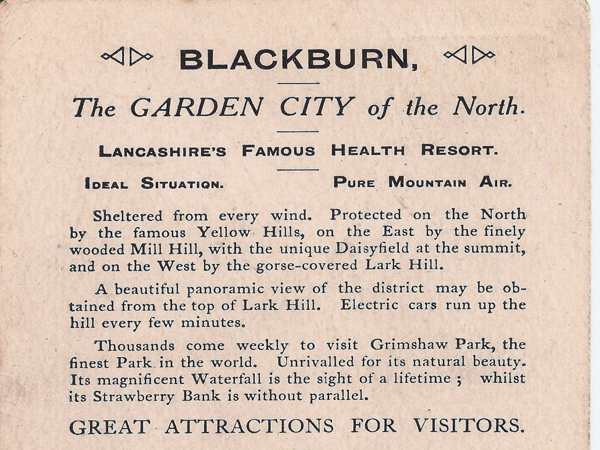Sometimes, a little humor comes from the most unexpected places, like a humble postcard. I found one such gem on eBay for £1.89, with an additional £1.26 postage from all the way in New Zealand. Dated 1908, it boasts of Blackburn as “The Garden City of the North,” a so-called health resort full of natural wonders. The postcard depicts this Lancashire town in a rather fanciful light, promising scenic views, world-class parks, and fairy-tale-like attractions. However, for anyone who has ever set foot in Blackburn, especially during its industrial heyday, these descriptions are pure fantasy.
Blackburn’s Garden City Illusion
The postcard begins by describing Blackburn as an ideal vacation spot, “Sheltered from every wind,” which, of course, couldn’t be further from the truth. Anyone familiar with Lancashire knows the area is blasted by relentless winds from all directions—the Irish Sea from the West, Morecambe Bay from the North, and gusts sweeping down from the Pennines. These mythical “Yellow Hills” mentioned as a shelter are, in reality, far from any natural windbreak.
Mill Hill is another amusing fabrication. While the name evokes quaint images of windmills or watermills, it actually refers to the cotton mills that dotted the landscape during the Victorian era. Growing up in the area in the 1960s, I remember Mill Hill as anything but idyllic. In fact, my school nearly collapsed, and we spent our days in the weaving sheds of the nearby Primrose Mill—hardly a setting one would associate with a picturesque “Garden City.”
Unique Daisyfield and Lark Hill: Misleading Promises
Further absurdity is found in the postcard’s description of “Unique Daisyfield,” which one might imagine to be a lovely meadow brimming with daisies. Sadly, this too is a falsehood. Daisyfield was yet another cluster of cotton mills, contributing to the industrial grit of the area rather than its natural beauty. Similarly, Lark Hill, which the postcard implies is alive with birdsong and lush greenery, is better known for its brutalist architecture and looming tower blocks—hardly a spot for nature lovers.
The grandiose claim that Grimshaw Park is the “finest park in the world” is equally perplexing. Far from being a sprawling park with waterfalls, Grimshaw Park is now home to a large ASDA supermarket. Back in the day, it was a dye works built on an old brickworks site—hardly the paradise described.
Exaggerated Attractions for Visitors
The postcard humorously invites visitors to fish in Snig Brook, touted as “the finest trout river in the Kingdom.” In reality, a ‘snig’ in Lancashire dialect refers to an eel, or any small wriggling creature. Snig Brook was not a serene trout river but a side street that was demolished long ago. Equally fictitious is the postcard’s depiction of “splendid boating” and “safe bathing” in the river Blakewater. This “river” is little more than a hidden trickle buried beneath Blackburn’s town center. Back when I was a boy, swimming in the Blakewater would have been risky, considering it often changed color depending on what dyes were being used upstream at the local factories.
The idea of sportsmen finding excellent shooting opportunities on Blakey Moor is laughable. Located in the heart of town, Blakey Moor is devoid of game. The only “grouse” you’ll hear is the complaints of the locals, as the area is now more notable for its educational institutions than its natural surroundings.
The Sylvan Retreat of Har-Wood: A Cultural Shift
The postcard paints Little Har-Wood as a woodland retreat, but this area, along with Bastwell, became the heart of Blackburn’s immigrant community. During the 1950s and 1960s, many families from India, Pakistan, and Bangladesh settled in these neighborhoods to fill post-war labor shortages. Today, Blackburn boasts the highest Muslim population in the UK outside of London. Although cultural tensions occasionally arise, the area remains a symbol of multicultural coexistence.
Sudell Cross and Pleasington: Final Reflections
Finally, the postcard references Sudell Cross as an ancient archaeological site. In reality, Sudell Cross is nothing more than a crossroads, once home to a water fountain that has long since been relocated to Pleasington fields. Pleasington may sound inviting, but its primary claim to fame is its cemetery and crematorium—a far cry from the idyllic imagery conjured by its name.
Conclusion: A Snapshot of Blackburn’s Industrial Past
For all its exaggerations and outright fabrications, this postcard from 1908 serves as a humorous reminder of how urban myths and idealized portrayals can distort reality. Blackburn may never have been the “Garden City of the North,” but for those of us who grew up there, its industrial history, cultural diversity, and enduring spirit tell a much richer story.

